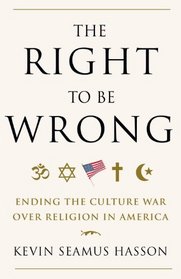Search -
The Right to Be Wrong: Ending the Culture War Over Religion in America
The Right to Be Wrong Ending the Culture War Over Religion in America
Author:
We call it the "culture war." It's a running feud over religious diversity that's liable to erupt at any time, in the midst of everything from judicial confirmations to school board meetings. One side demands that only their true religion be allowed in public; the other insists that no religions ever belong there. As the two sides slug it out, t... more »
Author:
We call it the "culture war." It's a running feud over religious diversity that's liable to erupt at any time, in the midst of everything from judicial confirmations to school board meetings. One side demands that only their true religion be allowed in public; the other insists that no religions ever belong there. As the two sides slug it out, t... more »
ISBN-13: 9780307718105
ISBN-10: 0307718107
Publication Date: 8/14/2012
Pages: 192
Rating: ?
ISBN-10: 0307718107
Publication Date: 8/14/2012
Pages: 192
Rating: ?
0 stars, based on 0 rating
Genres:
- Religion & Spirituality >> Religious Studies >> Church & State
- Religion & Spirituality >> Religious Studies >> Sociology
- Politics & Social Sciences >> Government >> Public Affairs & Administration





